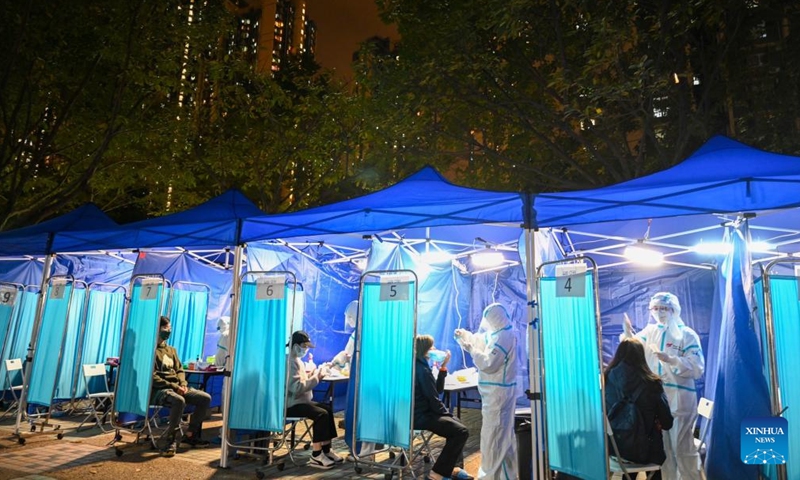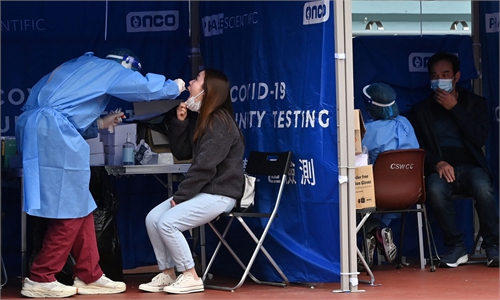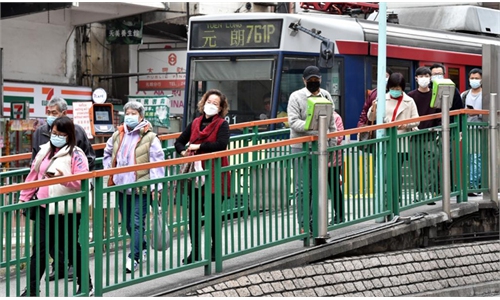Liaison office in HK vows to implement Xi’s instructions on controlling COVID-19 in SAR, as flare-up continues

Residents take COVID-19 tests in Kwai Chung of Hong Kong, south China, Jan. 23, 2022. Photo:Xinhua
The Liaison Office of the Central Government in Hong Kong said in a Wednesday statement that it will implement the instructions of Chinese President Xi Jinping on the COVID-19 prevention and control work in the Hong Kong Special Administrative Region (HKSAR) and will fully support the government's anti-epidemic fight amid a fresh surge in the city, which reported over 4,000 new cases on Wednesday.
The statement came after Xi conveyed his high attention on Hong Kong's recent epidemic situation and his care for the Hong Kong people to HKSAR Chief Executive Carrie Lam through Vice Premier Han Zheng, Hong Kong-based Takungpao reported on Wednesday.
Xi stressed that the HKSAR government should prioritize the task to control the epidemic, and central government departments and other local governments should fully support and help Hong Kong.
Xi said the HKSAR government should assume its primary responsibility in the epidemic control work, mobilize all available resources, and take all necessary measures to ensure the safety and health of the Hong Kong people and the overall stability of Hong Kong society, the report said.
Xi's remarks showed the leading role that the central government plays in Hong Kong's current fight against the epidemic - the latest COVID-19 outbreak is not a problem that Hong Kong alone can solve, and it is also related to national development and security, Lau Siu-kai, vice president of the Chinese Association of Hong Kong and Macao Studies who is also a senior government advisor, told the Global Times on Wednesday.
The liaison office's statement said the president's instructions are of great significance to Hong Kong society to pool efforts to put the epidemic under control.
Deputies to the National People's Congress and members of the National Committee of the Chinese People's Political Consultative Conference from HKSAR signed a joint statement, pledging to make good use of their own resources to cooperate with the HKSAR government's epidemic prevention work. Chinese mainland-invested enterprises in Hong Kong will also increase their cross-border transport capacity to ensure the supply of epidemic prevention materials and daily necessities, according to the statement.
Lam said that she would continue to lead the HKSAR government to make full use of the support from the central government and make an all-out effort to fight the epidemic as the top priority of Hong Kong, reported Hong Kong-based Wenweipo on Wednesday.
Xi's instructions are not only for the HKSAR government, but also a demand for Hong Kong-related agencies and local authorities on the mainland, Tian Feilong, an associate professor at Beijing-based Beihang University's law faculty, told the Global Times. He noted that Hong Kong's anti-epidemic fight has become a state-level task related to Hong Kong's stability and national interests.
The central government has decided to set up a work coordination mechanism, led by the Hong Kong and Macao Affairs Office of the State Council and the National Health Commission, to strengthen overall planning and coordination of relevant work, reported Takungpao.
The Guangdong provincial government also held a special meeting recently to make specific arrangements for supporting Hong Kong's fight against the epidemic and ensuring supplies to the city, said the report.
Hong Kong reported 4,285 COVID-19 cases on Wednesday, a new record in the number of daily cases. Of them, 4,264 were locally transmitted. Around 7,000 preliminary positive cases were also recorded.
Infections in Hong Kong have also spread to five cities in Guangdong and Chenzhou, Central China's Hunan Province.
Top mainland epidemiologists said Hong Kong must stick to the dynamic "zero-COVID" strategy and resort to stricter measures to stamp out the coronavirus infection and inject much-needed confidence in the city to keep the virus at bay.



